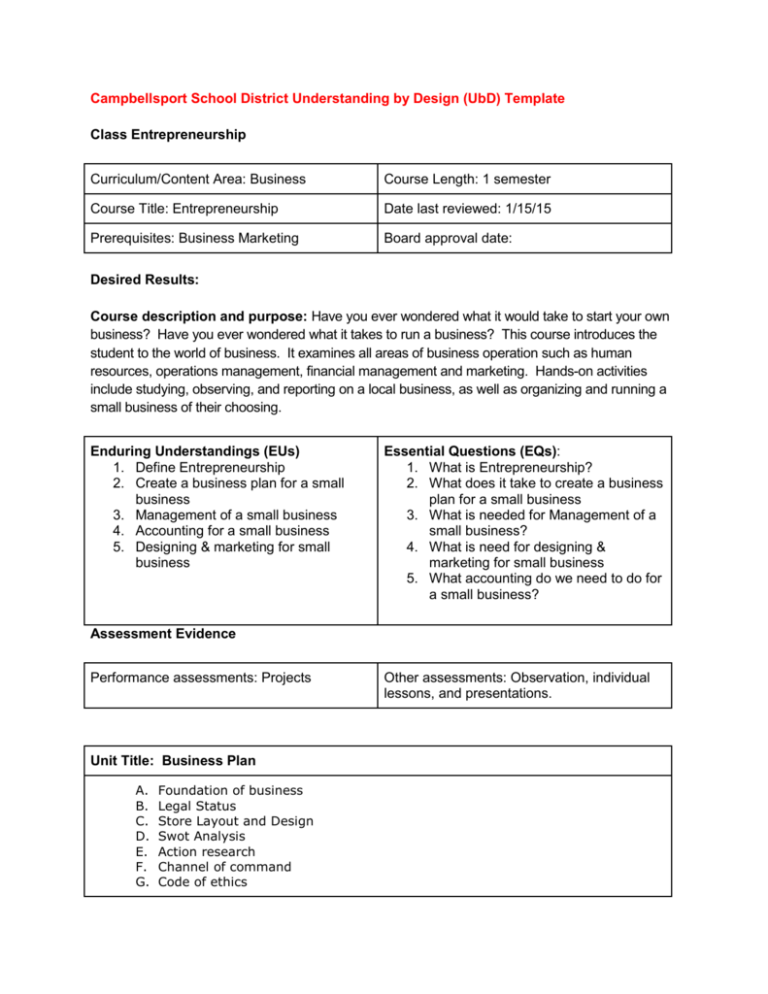New Course Proposal Form - Blank UbD Template
advertisement

Campbellsport School District Understanding by Design (UbD) Template Class Entrepreneurship Curriculum/Content Area: Business Course Length: 1 semester Course Title: Entrepreneurship Date last reviewed: 1/15/15 Prerequisites: Business Marketing Board approval date: Desired Results: Course description and purpose: Have you ever wondered what it would take to start your own business? Have you ever wondered what it takes to run a business? This course introduces the student to the world of business. It examines all areas of business operation such as human resources, operations management, financial management and marketing. Hands-on activities include studying, observing, and reporting on a local business, as well as organizing and running a small business of their choosing. Enduring Understandings (EUs) 1. Define Entrepreneurship 2. Create a business plan for a small business 3. Management of a small business 4. Accounting for a small business 5. Designing & marketing for small business Essential Questions (EQs): 1. What is Entrepreneurship? 2. What does it take to create a business plan for a small business 3. What is needed for Management of a small business? 4. What is need for designing & marketing for small business 5. What accounting do we need to do for a small business? Assessment Evidence Performance assessments: Projects Unit Title: Business Plan A. B. C. D. E. F. G. Foundation of business Legal Status Store Layout and Design Swot Analysis Action research Channel of command Code of ethics Other assessments: Observation, individual lessons, and presentations. H. I. J. K. L. Job analysis Interview Employee handbook Financing Presentation to Board of Directors . Standards: National Business Education Standards I. Entrepreneurs and Entrepreneurial Opportunities Achievement Standard: Recognize that entrepreneurs possess unique characteristics and evaluate the degree to which one possesses those characteristics. II. Marketing Achievement Standard: Analyze customer groups and develop a plan to identify, reach, and keep customers in a specific target market. III. Economics Achievement Standard: Apply economic concepts when making decisions for an entrepreneurial venture. IV. Finance Achievement Standard: Use the financial concepts and tools needed by the entrepreneur in making business decisions. V. Accounting Achievement Standard: Recognize that entrepreneurs must establish, maintain, and analyze appropriate records to make business decisions. VI. Management Achievement Standard: Develop a management plan for an entrepreneurial venture. VIII. Legal Achievement Standard: Analyze how forms of business ownership, government regulations, and business ethics affect entrepreneurial ventures. IX. Business Plans Achievement Standard: Develop a business plan. Learning Targets Addressed [“I can” statements (focus on skill-based vs. contentbased)]: 1. I can create the foundation of business 2. I can identify the legal status of a business 3. I can create a store layout and design for a business 4. I 5. I 6. I 7. I 8. I 9. I 10. I 11. I can can can can can can can can create create create create create create a Swot Analysis for a business action research to help make decisions for a business channel of command for a business a code of ethics for a business a job analysis for a business the necessary questions for an interview for a business create an employee handbook for a business find financing for a business Unit Title: School Business a. b. c. d. e. f. g. h. i. Marketing Communication Promotional marketing mix Product development Sales process Ethical behavior in personal selling Sales promotion Order development and processing Determining Actual pricing Formal Price quotes & negotiations Standards National Business Education Standards I. Entrepreneurs and Entrepreneurial Opportunities Achievement Standard: Recognize that entrepreneurs possess unique characteristics and evaluate the degree to which one possesses those characteristics. II. Marketing Achievement Standard: Analyze customer groups and develop a plan to identify, reach, and keep customers in a specific target market. III. Economics Achievement Standard: Apply economic concepts when making decisions for an entrepreneurial venture. IV. Finance Achievement Standard: Use the financial concepts and tools needed by the entrepreneur in making business decisions. V. Accounting Achievement Standard: Recognize that entrepreneurs must establish, maintain, and analyze appropriate records to make business decisions. VI. Management Achievement Standard: Develop a management plan for an entrepreneurial venture. VIII. Legal Achievement Standard: Analyze how forms of business ownership, government regulations, and business ethics affect entrepreneurial ventures. IX. Business Plans Achievement Standard: Develop a business plan. Learning Targets Addressed [“I can” statements (focus on skill-based vs. contentbased)]: 1. 2. 3. 4. 5. 6. 7. 8. I I I I I I I I can can can can can can can can participate in marketing communication create promotional marketing mix participate in product development participate in the sales process participate in ethical behavior in personal selling create sales promotions participate in the order development and processing determine actual pricing, quotes, and negotiations











